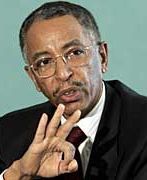Ambassador denies Sudan backed atrocities
By Bill Nichols, USA TODAY
WASHINGTO, March 3, 2005 — Sudan’s ambassador to the United States on Thursday rejected allegations this week by Human Rights Watch that the government in Khartoum directed and supported ethnic militia attacks and atrocities in the conflict-torn region of Darfur.
 Ambassador Khidir Haroun Ahmed told USA TODAY and Gannett News Service reporters and editors that the Sudanese government “has never given any license to kill or to burn or to loot in that part of the country.”
Ambassador Khidir Haroun Ahmed told USA TODAY and Gannett News Service reporters and editors that the Sudanese government “has never given any license to kill or to burn or to loot in that part of the country.”
After years of conflict over scarce resources, predominantly black rebels took up arms in early 2003 in Darfur, a region in western Sudan. The rebels accused the government of arming Arab militias who have terrorized villagers. The fighting has killed tens of thousands and displaced almost 2 million in what the United Nations has called the world’s worst humanitarian crisis. Last month, a U.N.-appointed panel said Sudan’s government and the Janjaweed militia were not guilty of genocide but did commit atrocities in the Darfur region that merit trials in the International Criminal Court.
The Bush administration accused the Sudanese government last fall of genocide in Darfur through “a consistent and widespread pattern of atrocities.” Khartoum admits arming some militias to fight the rebels. But Ahmed repeated the government’s insistence that it has no links to the militia known as the Janjaweed – Arab militiamen who have destroyed black villages and killed and raped inhabitants.
Human Rights Watch, a New York-based human rights group, says Musa Hilal, a leader of an Arab militia operating in Darfur, said in a videotaped interview, “All the people in the field are led by top army commanders.”
Ahmed also warned the Bush administration and Senate leaders to drop threats to impose sanctions against Sudan unless the government cracks down on the Janjaweed and other militia groups. He said the threatened sanctions encouraged the rebels. The rebel groups “will never negotiate … if there is a sword hanging over the head of the government,” Ahmed said. “This is not the way of making peace.”
The United States has proposed sanctions be imposed against Sudan by the U.N. Security Council but has yet to win approval, largely because of opposition by China and Russia.
On Wednesday, Sen. Sam Brownback, R-Kan., and Sen. Jon Corzine, D-N.J., introduced a bill calling for “hefty” U.N. sanctions against Sudan. It also calls for President Bush to name a special envoy to deal with the Darfur crisis.
Ahmed said Sudan’s government will prosecute anyone guilty of war crimes in Darfur and hopes for successful negotiations with rebels on securing a cease-fire during African Union-sponsored talks set to begin this month in the Nigerian capital, Abuja.
Instead of threatening sanctions, he said, the United States should pressure rebel groups to negotiate and press Western nations to follow through on pledges of aid to Darfur. The United Nations has received half of the $300 million it says it needs for relief operations.
